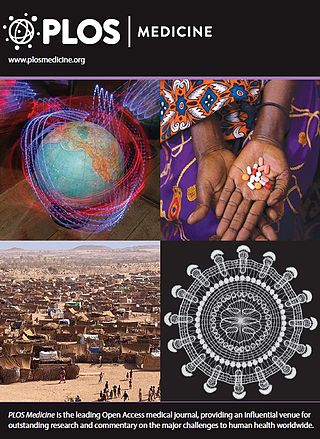Orthomolecular medicine is a form of alternative medicine that claims to maintain human health through nutritional supplementation. It is rejected by evidence-based medicine. The concept builds on the idea of an optimal nutritional environment in the body and suggests that diseases reflect deficiencies in this environment. Treatment for disease, according to this view, involves attempts to correct "imbalances or deficiencies based on individual biochemistry" by use of substances such as vitamins, minerals, amino acids, trace elements and fatty acids. The notions behind orthomolecular medicine are not supported by sound medical evidence, and the therapy is not effective for chronic disease prevention; even the validity of calling the orthomolecular approach a form of medicine has been questioned since the 1970s.

Sanjay Gupta is an American neurosurgeon, medical reporter, and writer. He serves as associate chief of the neurosurgery service at Grady Memorial Hospital in Atlanta, Georgia, associate professor of neurosurgery at the Emory University School of Medicine, member of the National Academy of Medicine and American Academy of Arts and Sciences and is the chief medical correspondent for CNN.

Stephen Joel Barrett is an American retired psychiatrist, author, co-founder of the National Council Against Health Fraud (NCAHF), and the webmaster of Quackwatch. He runs a number of websites dealing with quackery and health fraud. He focuses on consumer protection, medical ethics, and scientific skepticism.

PLOS Medicine is a peer-reviewed weekly medical journal covering the full spectrum of the medical sciences. It began operation on October 19, 2004, as the second journal of the Public Library of Science (PLOS), a non-profit open access publisher. All content in PLOS Medicine is published under the Creative Commons "by-attribution" license. To fund the journal, the publication's business model requires in most cases that authors pay publication fees. The journal was published online and in a printed format until 2005 and is now only published online. The journal's acting chief editor is Clare Stone, who replaced the previous chief editor, Larry Peiperl, in 2018.

Disease mongering is a pejorative term for the practice of widening the diagnostic boundaries of illnesses and aggressively promoting their public awareness in order to expand the markets for treatment.
Thomas William "Tom" Ferguson was an American medical doctor, educator, and author. He was an early advocate for patient empowerment, urging patients to educate themselves, to assume control of their own health care, and to use the Internet as a way of accomplishing those goals.

Medical literature is the scientific literature of medicine: articles in journals and texts in books devoted to the field of medicine. Many references to the medical literature include the health care literature generally, including that of dentistry, veterinary medicine, pharmacy, nursing, and the allied health professions.
Robin Marantz Henig is a freelance science writer, and contributor to the New York Times Magazine. Her articles have appeared in Scientific American, Seed, Discover and women's magazines. She writes book reviews and occasional essays for the Washington Post, as well as articles for The New York Times science section, op-ed page, and Book Review.
David Lawrence Sackett was an American-Canadian physician and a pioneer in evidence-based medicine. He is known as one of the fathers of Evidence-Based Medicine. He founded the first department of clinical epidemiology in Canada at McMaster University, and the Oxford Centre for Evidence-Based Medicine. He is well known for his textbooks Clinical Epidemiology and Evidence-Based Medicine.
Consolidated Standards of Reporting Trials (CONSORT) encompasses various initiatives developed by the CONSORT Group to alleviate the problems arising from inadequate reporting of randomized controlled trials. It is part of the larger EQUATOR Network initiative to enhance the transparency and accuracy of reporting in research.
A clinical prediction rule or clinical probability assessment specifies how to use medical signs, symptoms, and other findings to estimate the probability of a specific disease or clinical outcome.

John P. A. Ioannidis is a Greek-American physician-scientist, writer and Stanford University professor who has made contributions to evidence-based medicine, epidemiology, and clinical research. Ioannidis studies scientific research itself - in other words, meta-research - primarily in clinical medicine and the social sciences.

Medical journalism is news reporting of medical news and features. Medical journalism is diverse and reflects its audience. The main division is into (1) medical journalism for the general public, which includes medical coverage in general news publications and in specialty medical publications, and (2) medical journalism for doctors and other professionals, which often appears in peer-reviewed journals.
A medical journal is a peer-reviewed scientific journal that communicates medical information to physicians, other health professionals. Journals that cover many medical specialties are sometimes called general medical journals.
PharmedOut (PhO) is a Georgetown University Medical Center project founded in 2006. It is directed by Adriane Fugh-Berman. The stated mission of the organization is to advance evidence-based prescribing and educate healthcare professionals about pharmaceutical marketing practices.
Unnecessary health care is health care provided with a higher volume or cost than is appropriate. In the United States, where health care costs are the highest as a percentage of GDP, overuse was the predominant factor in its expense, accounting for about a third of its health care spending in 2012.

Devi Elizabeth Nampiaparampil is an American physician and researcher who specializes in preventing and treating chronic pain. She performs X-ray-guided invasive spinal procedures for pain, teaches medical students and trainees, comments on medical issues for various platforms, and appears on news and talk shows. She has appeared on the daytime soap opera General Hospital. Dr. Nampiaparampil also ran as for New York City Public Advocate in the November 2021 general election.
Isabelle Boutron is a professor of epidemiology at the Université Paris Cité and head of the INSERM- METHODS team within the Centre of Research in Epidemiology and Statistics (CRESS). She was originally trained in rheumatology and later switched to a career in epidemiology and public health. She is also deputy director of the French EQUATOR Centre, member of the SPIRIT-CONSORT executive committee, director of Cochrane France and co-convenor of the Bias Methods group of the Cochrane Collaboration.

Julia Belluz is a Canadian journalist who specializes in health and science reporting. She is the senior health correspondent for American news website Vox, as of August 2020. Belluz is known for her reporting on various public health issues, including the anti-vaccine movement, the COVID-19 pandemic, and medical pseudoscience. Her Maclean's blog, "Science-ish" and her "Show Me the Evidence" series on Vox both do deep dives into the science behind common health claims. Belluz has also reported on celebrities who give unsubstantiated health advice, such as Dr. Oz, Gwyneth Paltrow, and Alex Jones.
Madhukar Pai is an Indian medical doctor, academic, advocate, writer, and university professor. Pai's work is around global health, specifically advocacy for better treatment for tuberculosis with a focus on South Africa and India. Pai is the inaugural Chair of the Department of Global and Public Health in the School of Population and Global Health and holds a Canada Research Chair in Epidemiology and Global Health at McGill University.








